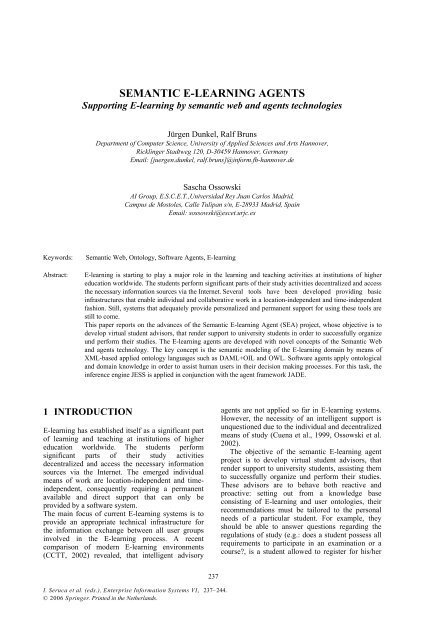Back Room Front Room 2
Back Room Front Room 2
Back Room Front Room 2
Create successful ePaper yourself
Turn your PDF publications into a flip-book with our unique Google optimized e-Paper software.
SEMANTIC E-LEARNING AGENTS<br />
Supporting E-learning by semantic web and agents technologies<br />
Jürgen Dunkel, Ralf Bruns<br />
Department of Computer Science, University of Applied Sciences and Arts Hannover,<br />
Ricklinger Stadtweg 120, D-30459 Hannover, Germany<br />
Email: [juergen.dunkel, ralf.bruns]@inform.fh-hannover.de<br />
Sascha Ossowski<br />
AI Group, E.S.C.E.T.,Universidad Rey Juan Carlos Madrid,<br />
Campus de Mostoles, Calle Tulipan s/n, E-28933 Madrid, Spain<br />
Email: sossowski@escet.urjc.es<br />
Keywords: Semantic Web, Ontology, Software Agents, E-learning<br />
Abstract: E-learning is starting to play a major role in the learning and teaching activities at institutions of higher<br />
education worldwide. The students perform significant parts of their study activities decentralized and access<br />
the necessary information sources via the Internet. Several tools have been developed providing basic<br />
infrastructures that enable individual and collaborative work in a location-independent and time-independent<br />
fashion. Still, systems that adequately provide personalized and permanent support for using these tools are<br />
still to come.<br />
This paper reports on the advances of the Semantic E-learning Agent (SEA) project, whose objective is to<br />
develop virtual student advisors, that render support to university students in order to successfully organize<br />
und perform their studies. The E-learning agents are developed with novel concepts of the Semantic Web<br />
and agents technology. The key concept is the semantic modeling of the E-learning domain by means of<br />
XML-based applied ontology languages such as DAML+OIL and OWL. Software agents apply ontological<br />
and domain knowledge in order to assist human users in their decision making processes. For this task, the<br />
inference engine JESS is applied in conjunction with the agent framework JADE.<br />
1 INTRODUCTION<br />
E-learning has established itself as a significant part<br />
of learning and teaching at institutions of higher<br />
education worldwide. The students perform<br />
significant parts of their study activities<br />
decentralized and access the necessary information<br />
sources via the Internet. The emerged individual<br />
means of work are location-independent and timeindependent,<br />
consequently requiring a permanent<br />
available and direct support that can only be<br />
provided by a software system.<br />
The main focus of current E-learning systems is to<br />
provide an appropriate technical infrastructure for<br />
the information exchange between all user groups<br />
involved in the E-learning process. A recent<br />
comparison of modern E-learning environments<br />
(CCTT, 2002) revealed, that intelligent advisory<br />
I. Seruca et al. (eds.), Enterprise Information Systems VI,<br />
© 2006 Springer. Printed in the Netherlands.<br />
237<br />
237–244.<br />
agents are not applied so far in E-learning systems.<br />
However, the necessity of an intelligent support is<br />
unquestioned due to the individual and decentralized<br />
means of study (Cuena et al., 1999, Ossowski et al.<br />
2002).<br />
The objective of the semantic E-learning agent<br />
project is to develop virtual student advisors, that<br />
render support to university students, assisting them<br />
to successfully organize und perform their studies.<br />
These advisors are to behave both reactive and<br />
proactive: setting out from a knowledge base<br />
consisting of E-learning and user ontologies, their<br />
recommendations must be tailored to the personal<br />
needs of a particular student. For example, they<br />
should be able to answer questions regarding the<br />
regulations of study (e.g.: does a student possess all<br />
requirements to participate in an examination or a<br />
course?, is a student allowed to register for his/her









